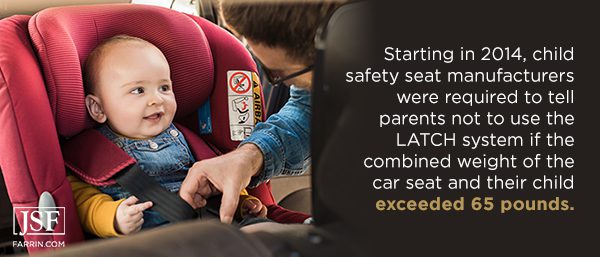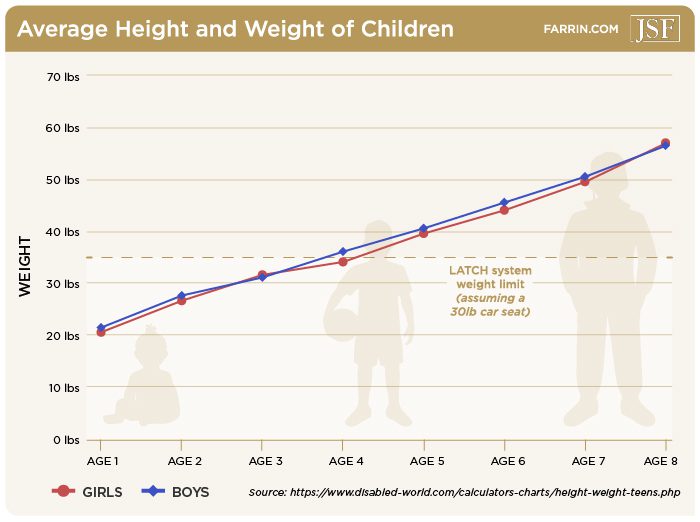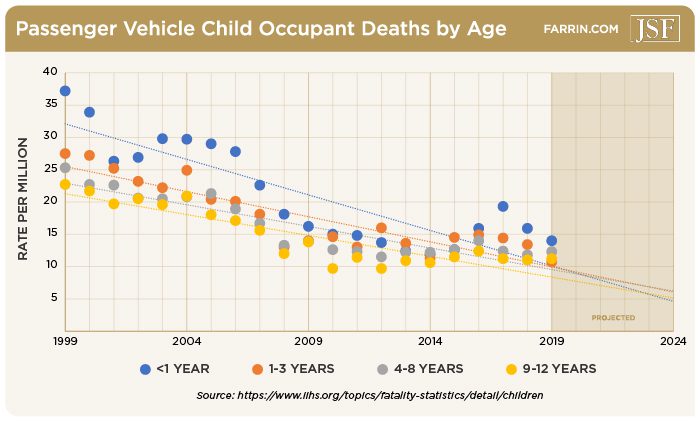Most vehicles manufactured since Sept. 1, 2002 are required to have what is known as the Lower Anchors and Tethers for Children (LATCH) system. This system joins child safety seats and vehicles together for the safety of the children riding in them.
In 2014, a new rule took effect which lowered the recommended weight. We examined the LATCH rule changes and what effects those changes had on children hurt in car accidents based on the data. If your child was hurt in an accident, consider contacting a car accident lawyer.
What Car Seat Rule Was Changed, and Why?
Starting in 2014, child safety seat manufacturers were required to tell parents not to use the LATCH system if the combined weight of the car seat and their child exceeded 65 pounds.
At the time, car seats were generally recommended for children of certain ages, regardless of weight. Car seats weighed generally between 15 and 33 pounds, which meant children as light as 32 pounds or as young as 3 could be affected by the rule.
The American Society of Pediatrics (ASP) recommended at the time that children remain in car seats with harnesses until age 8. But the average 8-year-old weighs more than 50 pounds. The ASP since changed its recommendation to “the highest weight or height allowed by the seat’s manufacturer.”
The change in the rule that led to the change in recommendation was the result of a petition by the Alliance of Automobile Manufacturers. The strength of the lower tethers built into vehicles was not enough to ensure the safety of heavier children.
As you can see, most children will exceed a 65-pound limit on a 30-pound car seat by age four or five. Comparing these averages (your child may weigh more or less, or be taller or shorter) with the recommendations for the manufacturers of car seats available on the market show that children are outgrowing car seats quickly.
But what does the data say about how that change affected the number of children killed in car accidents?
Did Child Fatalities in Car Accidents Increase as a Result of the LATCH Rule Change?
We’ve identified a few statistical sources that we can look at. First, the Insurance Institute for Highway Safety (IIHS) has compiled data on the deaths of children in car accidents, filtering them in a few ways. Here are the numbers by age (note that we are starting a few years before 2002, when the LATCH system was first required):
While we do see a rise in fatalities from 2014-2016 across all ages, it is difficult to attribute that rise to the rules regarding LATCH use. There are similar increases in fatalities in prior years as well, so the increase in fatalities in the years following the rule change is not surprising or even out of the ordinary.
How Should Parents Approach the LATCH System Moving Forward?
Research shows that child safety seats and the LATCH system work reasonably well. Unfortunately, much of the time, parents are not using them correctly.
Many websites give detailed instructions and advice to parents on how to choose and when to use car seats based on the LATCH recommendations. The Centers for Disease Control (CDC) estimates that 46% of car seats and booster seats are misused in a way that could reduce their effectiveness. The CDC further estimates that correct car seat use reduces the risk of injury in a crash by 71-82% for children compared to seat belt use alone.
According to an AAA Foundation survey released in 2014, Child Passenger Safety Technicians supported the LATCH system, with 81.3% agreeing that the system is effective if used properly. However, 80.5% claimed that errors in the installation were not easily noticed by parents and caregivers, and more than 80% encounter incorrectly installed or used safety seats “often” or “occasionally.”
Data from various sources put the misuse of child restraints at anywhere between 46% (according to the NHTSA) to 84%, depending on the type of restraint involved. At the same time, another statistic states that 96% of parents believe they are using the equipment correctly.
LATCH Works, But Only if Used Correctly
Given the available data, we conclude that the changes to LATCH recommendations in 2014 did not necessarily cause an increase in child traffic deaths. Unfortunately, not everyone is using child safety restraints correctly – or at all. The National Safety Council (NSC) has an interactive tool that shows child traffic fatalities comparative to restraint use.
The greatest danger to children, then, isn’t the LATCH system or its limitations. Parents and caregivers need to utilize the system and the car seats themselves correctly to gain the safety benefits. Consult with a Child Passenger Safety Technician to install the seat, verify its installation, or even teach you how to use the features if you’re not sure. You can find a tech online.
We see car accident injuries all the time as part of our job. It’s incredibly tragic when a child is hurt or killed in a car accident. If it happens to your family, don’t hesitate to contact us. We hope you never need to.
You May Also Be Interested In
What Happens to a Baby Left in a Hot Car?
Children Killed by Drunk Drivers – The Numbers Are Higher Than You Think






